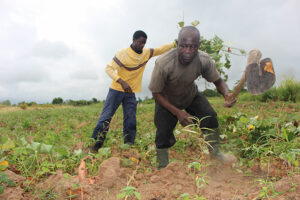

 The government is set to pilot 50 Farmer Service Centres across selected districts in the country in the first year of implementing its flagship Feed Ghana programme under the Agriculture for Economic Transformation agenda.
The government is set to pilot 50 Farmer Service Centres across selected districts in the country in the first year of implementing its flagship Feed Ghana programme under the Agriculture for Economic Transformation agenda.
Mr Peter Nuhu, Coordinator of the Farmer Service Centres, who disclosed this on the sidelines of a stakeholder engagement in Bolgatanga, said the number of centres would increase in subsequent years, with the goal of achieving full district coverage by the end of 2028.
“We ensured every region is represented, and within each region, we looked at historical data on agricultural production to determine which districts are most active agriculturally,” he said.
“In the Upper East Region, for instance, the top two or three agriculturally productive districts will be selected first to benefit from this pilot.”
Launched in April this year in Techiman in the Bono East Region, the Feed Ghana programme seeks to modernise agriculture and improve food security by targeting five crops and livestock categories: grains and vegetables (maize, rice, soybean, sorghum), selected livestock (poultry, goats, pigs, cattle), and key tree crops (cashew, shea, cocoa).
Central to the programme is the establishment of Farmer Service Centres, which will serve as one-stop hubs for farmers to access mechanisation services, farm inputs, extension support, credit facilities, and guaranteed market linkages.
The pilot will be implemented in 50 districts across the country, with priority given to regions and districts with strong agricultural output records.
The initiative aims to enhance productivity, create jobs, and curb input smuggling through a cooperative-led system.
Mr Nuhu explained that while large-scale farmers may not necessarily require cooperative affiliation due to their scale and ease of traceability, the Farmer Service Centres were primarily designed to serve smallholder farmers, who often lack the resources and structures to access mechanised services and input credit effectively.
The cooperative model, he noted, not only facilitates traceability but is also expected to help curb the longstanding issue of input smuggling that plagued previous initiatives, particularly Planting for Food and Jobs phase One.
“In the past, we supported individual farmers and could not trace them. Fertilisers and other inputs ended up in neighbouring countries like Burkina Faso,” and that this time, farmers would operate through cooperatives.
“For instance, if a cooperative receives 40 acres’ worth of input, they are accountable. And if a member fails to pay, the cooperative bears responsibility. That way, the group self-regulates to protect its credibility and benefits.”
Mr Nuhu stressed that under this structure, inputs such as fertilisers and machinery will be deployed more efficiently, saying, “tractors, for example, can be sent to a cooperative area where several farmers are ready, eliminating the uneconomical practice of moving equipment for isolated one-acre farms.”
Source: GNA
The post Ghana government to pilot 50 Farmer Service Centres in first year appeared first on Ghana Business News.
Read Full Story























Facebook
Twitter
Pinterest
Instagram
Google+
YouTube
LinkedIn
RSS